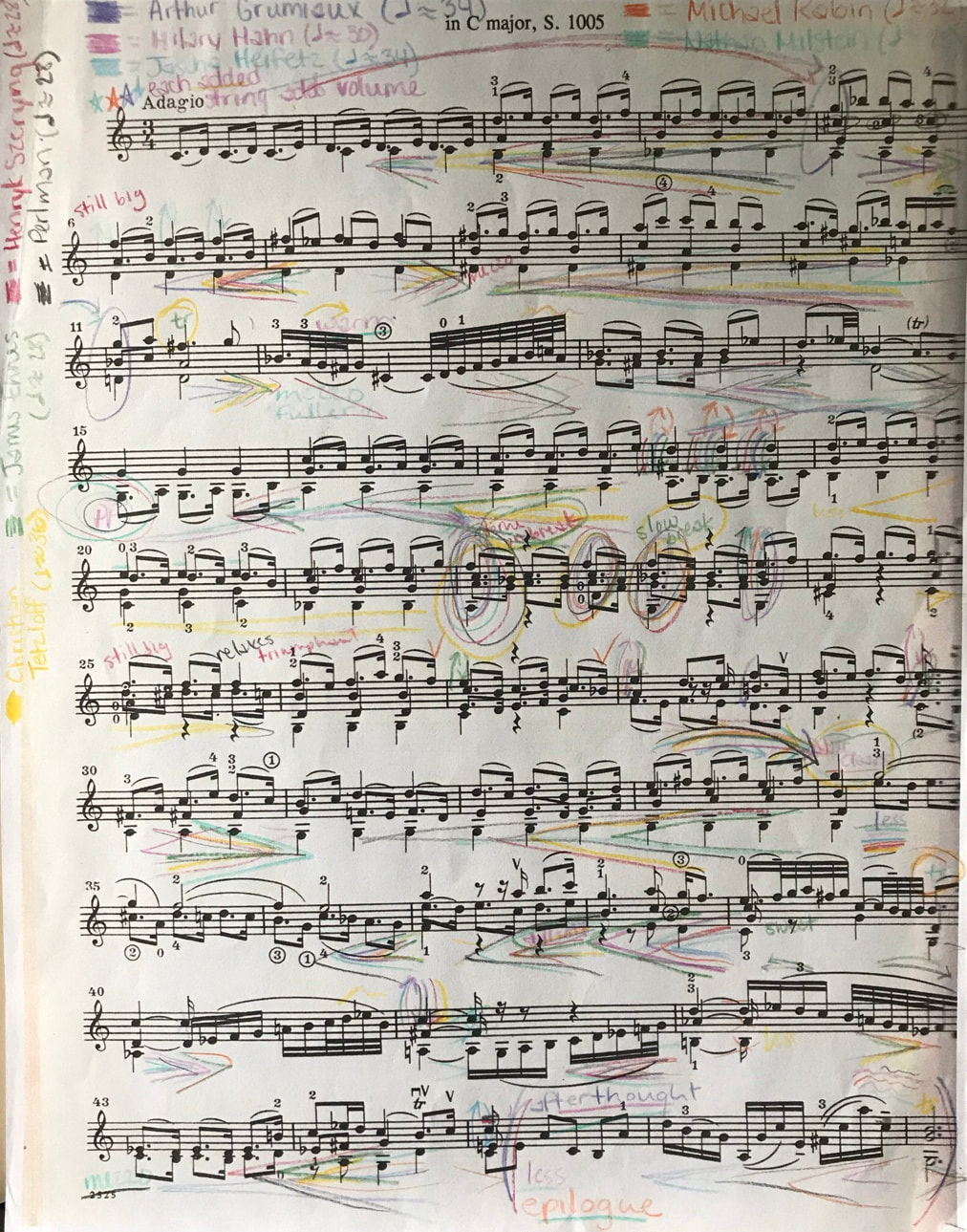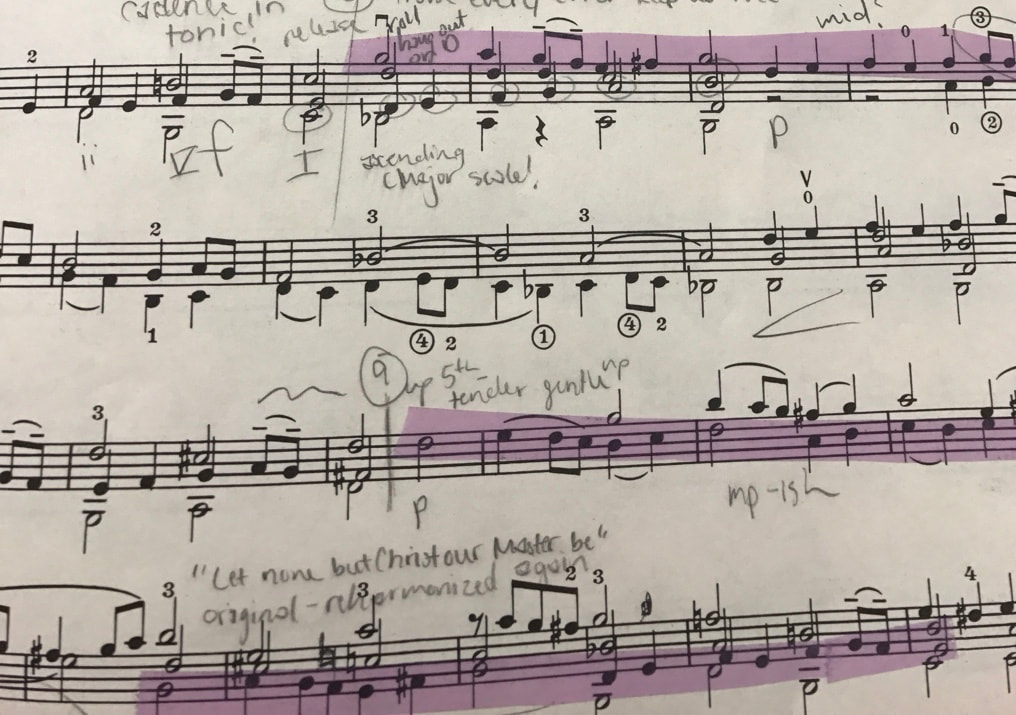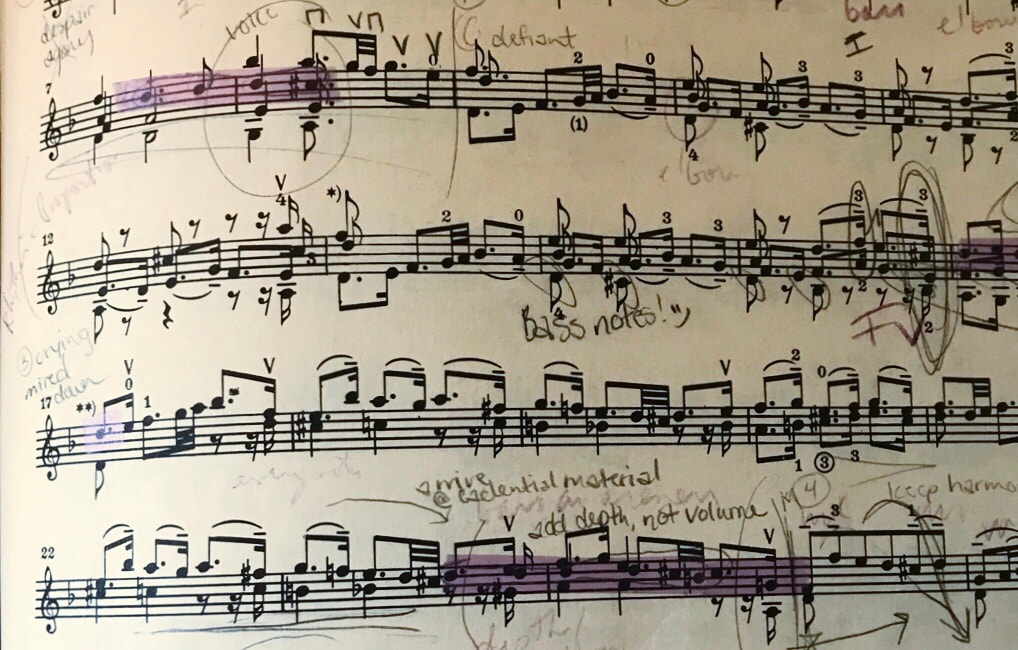One of my favorite ways to provide a visual reminder for what I’d like to prioritize is using highlighter tape. When I was younger, I used it to mark difficult passages that needed more attention in my practice. I loved it because, when I felt like I had sufficiently addressed any issues, the tape was removable and I could clear my score without damaging it! I also found that I could write on it in pencil so it didn’t hinder my usage of the score in any way. As I began studying my first solo Bach fugue, I used the tape to highlight the fugue subject or fragments of it. By drawing my attention to it visually, I was able to prioritize bringing it to the foreground of the texture when it was buried within chords (hey look, I’m talking about voicing again in solo Bach…go figure!). More recently, I’ve been using it while re-visiting the Chaconne from the d minor partita. The treatment D-C#-D motion in cadential progressions is fascinating to me and often the most interesting voice to my taste. The pitch I most associated with consonance and release reaches the height of tension in these progressions such that the leading tone is heard as relief to it. So, to make sure I draw the ear toward this progression throughout the piece, I’ve marked them all with highlighter tape so I know what I want to bring to the foreground. It’s all too easy to become overly cerebral with these exercises and get so caught up in the detail that the musicality becomes lost. However, I’ve found that by looking this closely at the score away from my instrument, I’m left with a clearer understanding of the musical inflection I want to craft. Side note: I need to give a huge shoutout to the Parker Quartet for talking about “inflecting” phrases during their masterclass for the University of Iowa String Quartet Residency Program on Monday- I’ve been mulling over how perfect that term is for what we do ever since then and I’m so grateful for the inspiration. By focusing on these details, I’m often led to larger-scale musical questions. Here are some examples: 1. How does the register of the fugue subject and the key area its in influence the character? 2. In what ways do the qualities I associate with the strings of my particular violin inflect the general character of a passage? 3. How does the texture of a particular passage influence my dynamic level? My answers to these and other questions directly guide my inflections on a piece. When I approach the piece with my violin again after taking the time to study it in one (or more) of these ways, my inflection on the piece is much more clear. Rather than fighting the score, I’m working with it for a more nuanced performance. What are some ways studying scores has benefited your practice? What are some techniques you use? Composers, do you leave any “easter eggs” in your music for discerning performers to find, or are they subconsciously placed? Please share in the comments section!
0 Comments
Greetings, friends!
It’s been a shameful amount of time since I’ve written a blog for my website. No, really, it’s been far longer than I ever intended it to be. Since my last post, I’ve given three out of four recitals for my degree, commissioned and premiered one new piece of music, and I’m entering my third year teaching some really great kids. Outside of my musical life, I hadn’t met my husband of 8 months yet last time I wrote! Saying that there’s been a lot of change would be a substantial understatement. Anyway, I’ve chastised myself for not writing on numerous occasions and, in my typical manner, ended up avoiding the blog like a very sad, guilty puppy. Well, no more! I’ve reached the point in my degree where I’ve managed to leave my Fridays entirely wide open. Yes, that’s correct, I don’t have class on a Friday for the first time since 1995. As a result, I feel like it’s absolutely feasible to commit to writing blog posts on a more frequent basis than…every two years. I don’t know exactly how often I’ll be able to write, but I’d like to be posting at least once a month, if not every other week. I’m not entirely sure how long I can keep that momentum up, but engaging with people is what I love about music. If my online presence doesn’t support that, I’m not quite doing something right. Once upon a time, I made a list of topics I would like to explore on my blog relating to the various aspects of music-making that are important to me and central to my work. I’ve been listening when people have asked for me to write a blog post about a certain topic or expressed interest in knowing more about a particular idea I have. I’ve been brainstorming some other ideas that I think may be pretty neat (who knows, if I keep my momentum up, I may even consider bringing in some guests to write occasionally!). However, these posts aren’t nearly as rewarding for me if no one reads them and/or engages with them. If I wanted to simply hear my own thoughts about these topics, I wouldn’t post them on the internet or I’d disable the comments section. So, I’m asking that you leave a comment on this post if you read it. Introduce yourself if I don’t know you. Say “hi!” if you do and tell me something you’ve been up to that gives you joy. If you have something you’d like to see me write about, tell me in the comments! As much as this is my blog, I feed off of collaboration and the enthusiasm of other people so I’ll probably write about it at some point. Thanks for reading, friends! I can’t wait to hear from you. |
Archives
November 2018
Categories
All
|




 RSS Feed
RSS Feed